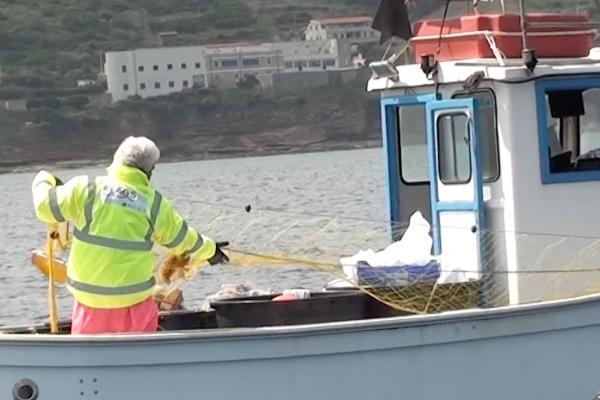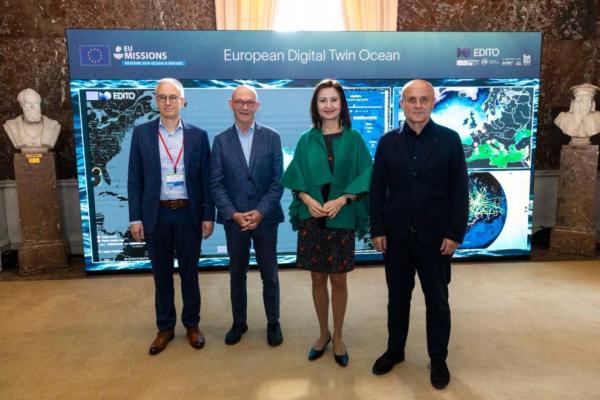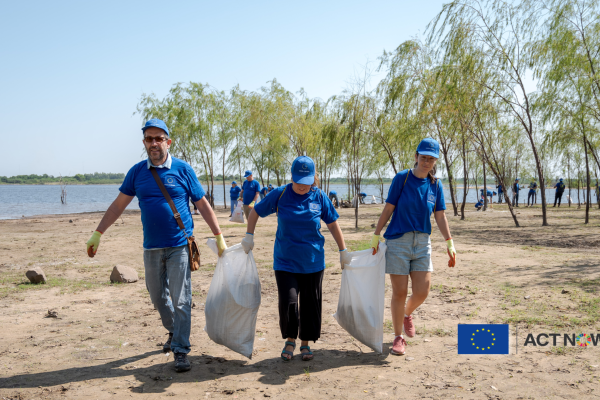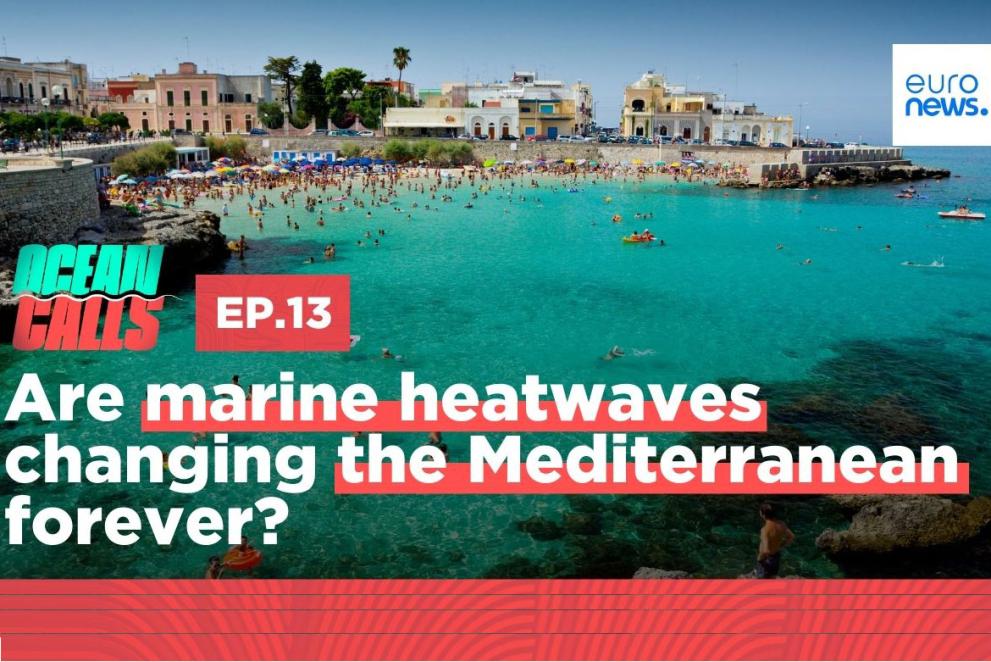Healthy ocean ecosystems are those exhibiting normal form and function that is demonstrating sufficient organisation, vigour and resilience to allow the ecosystem to exist, thrive and evolve as a natural system.
Clean oceans are oceans free from any type of pollution reaching them from any pathway (e.g. direct discharge, runoff, pollution from ships, deep-sea mining etc.)
Main pollution types are
- eutrophication (nutrient pollution)
- contaminants (pesticides, heavy metals, toxins)
- underwater noise (oil drilling, shipping)
- ocean acidification (atmosphere CO2 dissolving in ocean)
- marine litter (plastic, wood, metal, etc.)
Actions
Marine pollution has no borders. Marine pollutants entering oceans in one country may travel long distances due to shifting winds, seasonal currents and migrating species. Therefore, coordinated EU-level actions and initiatives are of benefit to all EU countries bordering the European seas.
To restore ocean health, the EU aims to regenerate and recover European marine ecosystems by 2030 through actions to achieve cleaner marine waters, restore their rich biodiversity and make our blue economy climate friendly.
The Commission contributes to this effort by initiating legislation, for instance on
- banning certain single-use plastic items
- encouraging ship operators to deliver all waste to ports
- improving the rules on reporting of lost fishing gear
- restricting microplastics intentionally added to products, e.g. in cosmetics or detergents
- reducing emissions of microplastics to the environment
It sets the criteria for good environmental status under the Marine Strategy Framework Directive which requires EU countries to report on the state and the measures taken to achieve this status.
The Commission also steps up its commitment to the fight against marine litter at international level, including in the UN, G7, G20 and other international fora. It promotes regional cooperation with Regional Sea Conventions and finances. projects in the European neighbourhood (Mediterranean and Black Sea). On a global level, Commission services are working on large projects that contribute to marine litter reduction, for example in Southeast Asia, the Pacific and South America.
In May 2021, the Commission proposed new measures on reporting lost fishing gear and facilitating its retrieval. The new reporting measures will allow the quantities of fishing gear placed on the market to be compared with those collected. This will give the recycling business a clear view of the opportunities and provide the necessary input for the Commission to establish binding Union collection targets in the future.
EU funding and research
The Commission allocates funds from the European Maritime, Fisheries and Aquaculture Fund (EMFAF) to develop solutions for restoring and maintaining ocean health, and tackling marine litter.
The EMFAF also compensates fishermen for bringing ashore waste caught in their nets during normal fishing operations rather than dumping them back into the sea.
The Commission drives research to create innovative and impactful solutions for clean and healthy oceans. Horizon Europe, includes a new approach – a Mission on healthy oceans, seas, coastal and inland waters.
Finally, the Commission compiles and manages data to support knowledge-based decision making (EMODNET and Atlas of the Seas).
EU events and workshops
Every year, the European Commission organises the European Maritime Day.
It also organises the annual, global #EUBeachCleanUp campaigns in collaboration with the European External Action Service, the United Nations and the Smurfs, joining forces with local communities, NGOs, schools and private companies to clean beaches and to raise awareness among the young generation across the world.
Relevant stakeholders come together in specific workshops organised by the Commission.

- News article
Bringing science and fisheries together to tackle a hidden menace: marine litter. Scientists from Cagliari University and Fisheries Local Action Groups and Sardinian fishers joined forces to remove over two tonnes of waste from Sardinian waters.
- 2 min read

- News announcement
The European Digital Twin of the Ocean (EU DTO), announced by President von der Leyen at the One Ocean Summit in Brest in February 2022, is a key deliverable of the EU Mission Restore our Ocean and Waters.

- News announcement
The #EUBeachCleanup Campaign 2024 is kicking off this week, right after World Oceans Day.
- 1 min read
Documents
Media
Euronews Ocean: Cleaning Europe's rivers: Meet the teams trying to turn the plastic tide
Fishery rules that exist only on paper won't make fishing any more sustainable. One way to enforce these rules, especially in vast ocean areas where monitoring is hard, is through joint inspection programs. The European Fishery Control Agency (EFCA) helps coordinate such inspections for EU countries and trains inspectors from neighbouring nations.

OCEAN CALLS Podcast: Are marine heatwaves changing the Mediterranean forever?
The Med is getting heatstroke. From May to August last year, nearly the entire surface of the Mediterranean was hit by marine heatwaves. Why are the heatwaves happening, what's the impact on corals and fish, and can we do anything about it?
Listen to it in full on Euronews website
Euronews Ocean: Ocean health and human health
The ocean provides us with food, water and air. Its health directly affects our health. While new research shows positive effects of interaction with coastal nature, new potential threats are causing growing concern — for example, pollution of the marine environment caused by industrial exploitation of its resources, or by pharmaceutical residues in sewage driving evolution of antibiotic-resistant germs in coastal areas.
Euronews Ocean: Ports and seaside cities
Ports are the heart of our global trade, connecting the world and fuelling economic growth. But with this power comes a problem – a massive carbon footprint. As Europe sets sail to becoming climate-neutral by 2050, how can our ports, the gatekeepers of commerce, join this green transition and help build a more sustainable future?
Euronews Ocean: Cleaner ships on the horizon: wind and electricity propel shipping sector towards reduced emissions.
From sails to electric propulsion — new "green ships" steer away from fossil fuels, showing a way for some marine transportation to reduce their emissions. In this episode of Ocean, we visit the first modern cargo sail vessel — "Gran de Sail" — that regularly crosses the Atlantic Ocean transporting wines, coffee and cocoa beans, to see how the traditional propulsion method from the golden age of maritime discoveries can get its second wind in today's carbon-conscious economy.
Euronews Ocean: Reducing plastic in fishing and aquaculture: what alternatives to protect our oceans?
In this episode of Ocean, we are zooming in on EU-supported projects that help solve the problem of plastic marine pollution caused by derelict fishing and aquaculture gear.
Euronews Ocean: The dangers of marine litter - and the innovative methods to combat it
As part of our Euronews' Green Tomorrow initiative, Ocean has been investigating new methods to combat the scourge of marine plastic litter which, if left unchecked, could mean more plastic waste than fish in our oceans in three decades' time.
Euronews Ocean: When it comes to cleaning up the Oceans, technology may be good but education is even better
EU sponsors clean-up operations, but a change in mentalities is the key to success…
